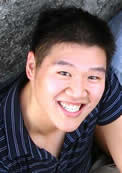5/23/2014
Penn Sociology is proud of all of our students for their hard work and dedication to the program. Today we highlight one of them, Hua-Yu Sebastian Cherng, who recently received his Ph.D in Education Policy and Sociology.  Sebastian's research interests are in the areas of comparative perspectives on race/ethnicity, immigration, youth and adolescence, development, and education. As such, his scholarly work has focused on the social lives of racial/ethnic and immigrant adolescents in the United States, gender and ethnic differences in education in China, ethnic identification in China, and cultural and social capital transfers between US adolescent friends. He will be joining the faculty of New York University as an Assistant Professor in International Education this Fall.
Sebastian's research interests are in the areas of comparative perspectives on race/ethnicity, immigration, youth and adolescence, development, and education. As such, his scholarly work has focused on the social lives of racial/ethnic and immigrant adolescents in the United States, gender and ethnic differences in education in China, ethnic identification in China, and cultural and social capital transfers between US adolescent friends. He will be joining the faculty of New York University as an Assistant Professor in International Education this Fall.
We had a chance to catch up with Sebastian to learn more about the motivation behind his research, and why he chose Penn Sociology.
What motivated you to engage in the particular research you are doing?
For most of my life, I have worked with minority youth in a number of capacities: as a middle school math teacher, youth organizer, foreign language instructor, and mentor. Although I am convinced that many marginalized young people possess a resiliency that eclipses my own, many of my students, after leaving my classroom, had less than ideal outcomes. Even in vastly different contexts, such as impoverished rural China or immigrant enclaves in large US cities, I found similar stories and shared experiences. Therefore, the desire to understand the larger forces that shaped the lives of minority youth – and ultimately to help make things right – forms the basis of my research agenda.
How do you hope to build on this research as you continue your academic career?
Currently, I am transitioning from my role as graduate student to professor, and will further establish my research agenda that I have started during my time at Penn. An aspect that will be newer to me will be teaching courses based on my research, such as courses on comparative ethnicity and education, immigration in the US, etc. Moreover, I look forward to working with other scholars, policymakers, and practitioners to better address the needs of our youth.
What factors went into your decision to choose Penn Sociology?
I was a joint PhD student with sociology from Penn’s Graduate School of Education, where my program was Education Policy. I believe it is rare that a university allows such flexibility of study between schools, and operating in both worlds allowed me to learn the norms of both sociology departments and schools of education.
The main draw, of course, was the faculty. My interests in marginalized youth in both US and Chinese contexts were a great match for the expertise of Drs. Grace Kao and Emily Hannum.
How has the department been able to support your research interests?
As a sociologist who studies the social relationships in the lives of young people, I know very well the power that parents, teachers, and friends have in shaping important outcomes. Imagine the importance of good advisors, who take on the responsibilities of all three key actors!
When I reflect on my time at Penn, I think of my interactions with my mentors, Dr. Kao and Dr. Hannum. When I came to Penn five years ago, I knew almost nothing about sociology (my alma mater didn’t even have the major). I’m still not sure why both were willing to work with me in the first place, but I am supremely grateful. I am the scholar I am today because of the incredible and excruciatingly time-consuming effort of Dr. Kao and Dr. Hannum.
Many graduate students in the department were also a great resource, not only to brainstorm about paper ideas or figure out a particularly arcane statistical method, but for social support. And the administration in the department cannot be beat. Their help really allowed me to focus primarily on my research.
What is the biggest thing you've learned about yourself during your time as a graduate student?
When I first considered entering a PhD program, a co-worker (who was a teacher) said that people who go to grad school “lose their souls.” I didn’t know what that meant at the time, but I think for students who forget why they came to grad school (or didn’t have a good reason to begin with), a PhD can be tough.
I worked both my hardest and happiest when I realized that finishing the program and becoming a professor, while worthy goals, did not motivate me to return to school. Instead, the responsibility I believe I have to society and its young people is still the reason for doing what I do. And the knowledge, skills, and relationships I have cultivated during my time at Penn will definitely help me toward this goal.
***
"Arial","sans-serif";color:#222222;background:white">To check out the profiles of our graduate students, visit our Graduate Student Page.
"Arial","sans-serif";color:#222222;background:white">For more information about Sebastian, visit his personal website.
